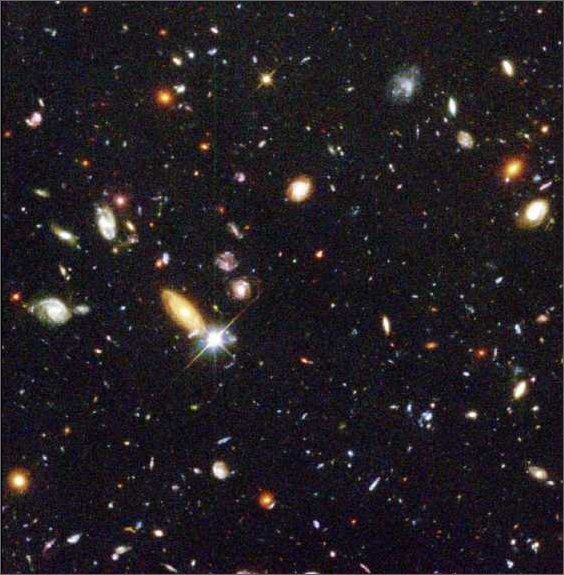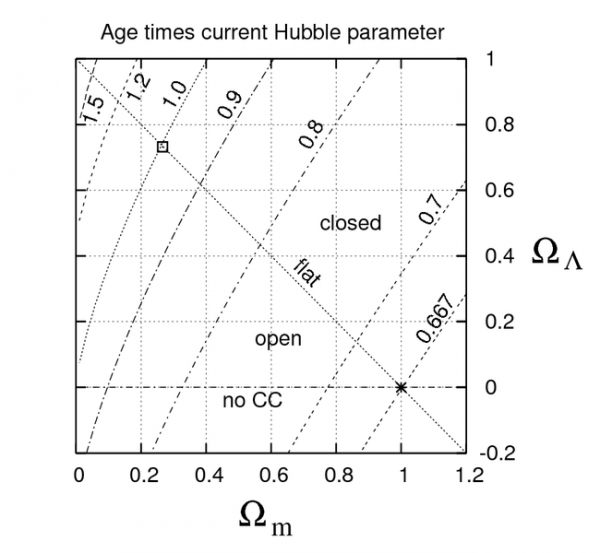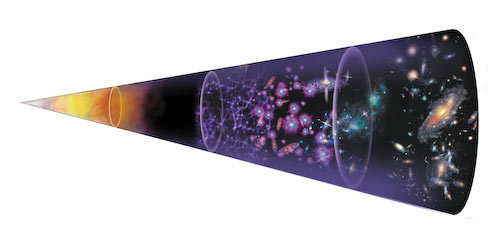One of the most surprising things about the Universe? As vast as it is, it hasn't been around forever. In fact, if you take our plain little rocky home (Earth), it looks like the Universe is only about 3 times as old as we are. It's surprising, considering how huge, expansive, and full of interesting things the Universe is.

And yet, our Sun, Earth, and entire Solar System, at 4.5 billion years, represents a significant fraction of the age of the Universe, about 13.7 billion years.
But how well do we know that number? If you look at the best data, you find that the Universe is 13.73 billion years old, with an uncertainty of about 0.13 billion years in either direction.
But that's not entirely accurate. There are some assumptions made in figuring this out, including:
- The Hubble parameter is the same everywhere in the Universe,
- The Universe consists only of photons, normal, dark matter, cosmological constant, and low-mass neutrinos, and
- There's no funny stuff going on.
This may or may not be true, but there are some caveats here. The uncertainty quoted about was determined with "likelihood calculations," which muffle some of the real uncertainties. For example, the Hubble constant is quoted as 71 km / s / Mpc. But nobody would really be surprised if it was 65, or if it was 75. And yet, just changing that one parameter gives you an age range of 12.5 to 14.4 billion years!

We know this from the observed relation (above) that (the age of the universe) * (the Hubble parameter) = 1.0. This can make a huge difference, to be sure, and yet it's perfectly within reason at this point. Similarly, the parameters of normal matter, dark matter, and cosmological constant density can be tweaked as well; so long as the data for the CMB, supernovae, and large-scale structure are fit to the model, there's quite a substantial workable range.
So when I see people writing about discussing the uncertainty in the age of the Universe, I am hopeful that this is what they're talking about. You see, the uncertainties are much larger than are reported, and actually leave more than a billion years of wiggle-room. So go ahead, ask your second-favorite cosmologist (because I know I'm your favorite) if they'd be shocked if the Universe were either a billion years younger or older than the best estimate; if they're any good, the answer will be "no."

But the flip-side of this is that it would be shocking if the Universe were 11 billion or 16 billion years old; those are pretty firmly excluded. So we know this age business pretty well, but not necessarily as well as most people think!

Interesting post.
A (slightly related) question: Are there as many people arguing that scientists are wrong about the universe (or Earth) being billions of years old, as opposed to a few thousand, as there are evolution-deniers pestering biologists?
I guess that's one of my pet peeves; that time since the big bang = age of the universe. It sets the time of the big bang pretty arbitrarily at t=0. I know that by definition we cannot look back past the singularity, but unless we get an idea of either where the singularity came from (resulting in a pre-big bang time) or why is spontaneously came into being out of nothing (for the t=0)I feel this is a very counter intuitive part of the model.
Dean, I haven't gotten any since I was an undergrad, but I'm sure they're out there. That's my area of expertise, though, so I'm happy to duke it out with them if you find any.
Mu, it doesn't make sense to talk about "time" when we're talking about there not being any of this "space-time" that we're used to. You can call it a pet peeve, but as a physicist, I'm super pissed that we really can't know what created the big bang (or created inflation, if you want to take one more step).
Well, there's your chance, the standard model could absorb dark matter, dark energy and inflation, I'm sure it can handle a pre-big bang extension too. Just give the singularity some pre-existing speed, and you probably can kick out inflation while you're at it.
The Texas Board of Education just recently passed an amendment for the age of the universe to be between 12-14 billion years old for Texas science standards.
I just finished reading Victor Stenger's "Quantum Gods: Creation, Chaos, and the Search for Cosmic Consciousness" and he suggest the possibility that either the universe started from chaos (total entropy) via quantum tunneling or with our universe emerging with the time arrow in our direction and another one with the time arrow in the opposite direction. Have you read it yet Ethan? If so, what do you think about those hypotheses?
I asked, Ethan, because here in west michigan i get students in my math/stat classes who complain about having to "repeat the lies about the age of the universe" in their science courses. The number is small, but I'm amazed it's non-zero.
Not quite crunch: the vote was about this:
"During the Texas State Board of Education hearings on science standards for Texas schoolchildren, BoE member and staunch creationist Barbara Cargill decided that the age of the Universe was up for vote. " More of the story here:
http://blogs.discovermagazine.com/badastronomy/2009/05/06/texas-is-only…
It's bad enough that people like Cargill are screwing with science education in Texas: it is really scare to contemplate the possible impact that will have on science texts used around the country.
Sorry, but you'll have to take second place because I have an astrophysicist in the family. Many other science blogs seem to be plagued with religion vs science debating, which distracts from all the much more interesting things in science that we could all be learning about.
on the comments to an earlier post I wondered: 'what do distances to very old objects mean, in terms of an expanding universe?'. I managed to get a good explanation from la wikipedia (in the "Observable Universe" entry), that I thought I would share:
So if I understand this correctly, when information from an object that's almost as old as the universe reaches us (like say GRB 090423); that object (or the spot where it used to be) is currently over 45 billion light years away. at the time the X-rays started traveling, however, it was much closer- maybe around .2 billion light years away?
It's not like it's the most counter-intuitive thing in physics. Why should physics be intuitive anyway?
Today, a more accurate measurement of the Hubble constant has been released.
http://hubblesite.org/newscenter/archive/releases/2009/08/
what's up with my nice, informative, apropos comment not being posted?
huh - that one went through. Maybe i had too many href's for the spam blocker. ANYHOOO - I wanted to add what I learned on wikipedia, about the 'Observable' universe. though the universe is 13.7 billion, we can see out 46.5 billion years out in any direction - because of expansion! i believe this implies that GRB 090423 (whose X-rays just reached us even though they started 13 billion years ago), was AT THE TIME, much closer to the point in space we currently occupy.
What I don't get is how can something be seen that is almost as far away in light years as the universe is old. We are not hurling through space at relativistic speeds, neither is the thing we see. How did we get to be so far apart? Was the Universe born big?
Jodie:
No, the theory is that the universe was born extremely small and then inflated large in the first 10-35 seconds. It has been expanding at a slower rate than that initial inflation ever since. Everything in the universe started at one point.
jodie, that is discussed in the thread above. Actually we see objects that are much farther away in light years. The spacetime of the universe itself expands.
Conversely, the part of the universe we see was born really small.
If spacetime itself expands, then what is the significance of saying something like the Universe is x billion years old. If we can see things that are 45 billion light years away, then in our perception of spacetime the Universe is at least 45 billion years old, right? Perhaps infinitely old?
Or am I just demonstrating how little of this I get? It's fun anyway.
Jodie:
Firstly, though I'm sure your numbers are just an example, we don't see anything that is 45 billion light years away. Objects at that distance might exist, but the light hasn't had enough time to get here.
You would be completely correct if we only used a single method (visual) for determining the age of the universe. However, using other methods, we can refine that picture for one that is more complete (and often more complex). That's where the background radiation and expansion rate comes in.
Sean,
What about this quote from the thread:
"we are now observing objects that are now considerably farther away than a static 13.7 billion light-years distance. The edge of the observable universe is now located about 46.5 billion light-years away"
I am completely confused by such claims.
Jodie,
I don't have any confirmation of the actual distance of the gamma ray burst mentioned (GRB 090423), but you must remember that a light-year is a unit of distance, not time.
So something that is 13 billion years extant might be many more billions of light-years distant.
I also notice that in your quote, you change the 13.7 billion years to light-years. The 13.7 years actually is years, a measurement of time.
That's most likely where your confusion stems from.
Sean,
Humm... It seems to me that a light year is a measure of time in the sense that if the speed of light is constant, something that is 13.7 billion light years away produced the light we detect today 13.7 billion years ago.
And if that were not bad enough, if an object is 45 billion light years away, and light traveling at a constant speed only now arrived, then how is the universe not 45 billion years old?
And if it was closer when the light left the source, then why did it take so long to get here?
Still confused, I am sorry to say.
Jodie,
Perhaps I can help you out. Imagine you have a balloon that's inflated, and you have two pennies glued down to it at different spots. If you send a light pulse out from one of them, it will reach the other one in a certain amount of time. If the two pennies were 10 light-years apart, it would take the light 10 years to reach you.
But the balloon could either be inflating or deflating, too. If the balloon were deflating quickly, the distance the light would travel would be less than 10 light-years, because there would be less space than 10 light-years for the light to travel. Perhaps it would only take 8 years to get to you. Additionally, by the time the light did get to you, the other penny would be *much* closer to you, maybe six light-years, because the space has continued to contract, even as the light has been on its journey.
Now imagine the opposite, that the balloon is inflating. Well, instead of 10 years, because space is expanding, maybe it will take 15 years to reach you. But -- as space expands -- the second penny gets farther and farther from you, so that, by time the light gets to you, it's more than 15 light years away from you. Maybe it's even 20 or 25 or more light-years away by time you get it.
The speed of light isn't changing, but the amount of space between the two pennies is.
Ethan,
That does help. But does that imply that space can expand at rates that rival the speed of light?
Can space expand so fast that light can never reach between two objects?
Jodie,
The units are different. Space doesn't expand at a speed; it expands at a "speed-per-unit distance". In other words, if you're 1 meter away from me, maybe I can expand away from you at 1 meter per second. And if your friend is another 1 meter away from you, she can expand away from you at 1 meter per second, and away from me at 2 meters per second.
Neither one of us is really moving, it's just that the space between us is expanding.
For things that are far enough away, space can expand so fast that light will never get between two objects. We call this "redding out", and it is currently happening to the farthest objects in the Universe.
You can thank dark energy, that incredible bastard.
I think I get it.
Actually it makes perfectly good sense, if you buy the balloon analogy.
And to be clear then, when we see an object that is 13.7 billion light years away, the light leaving the object did not leave the object 13.7 billion years ago. Or did it?
Or what about the object that is 45 billion light years away? How long ago did the light we are receiving leave that object?
Jodie, I think you've got it, too. When we see the object "at the edge", or 46.5 billion light years away, it took 13.7 billion years for the light to travel to us. So we are seeing things at the very beginning of the Universe. (That is, FYI, what the Cosmic Microwave Background is.)
That object is currently 46.5 billion light years away from us, because the space has been expanding since the light was emitted from it.
And when it first emitted that light, we were a lot closer to it than 13.7 billion light years, but the light has been traveling through this "expanding space", meaning there's been more and more of it to go through. That's why it's taken this long for it to get to us.
Bravo!
46B light-years owwsss that's very very far
46B X 300,000 X 60 (seconds) X 60 (minutes) X 24 (hours) X 365 (days) =
435, 196, 800, 000, 000, 000, 000, 000 kilometers away
the light has travelled...
Ever wonder, sometimes, whether the Big Bang and the moment of God Creation, were one in the same? If there was a God Creation, there would be a great outpouring of energy like in the Big Bang. God would be very old and the 6 calendar day account and other accounts of Creation would be an allegorical telling of the beginning in a way that the writers and readers could understand.
Sometimes I wonder about that, look up and smile, and wonder if ours is one among many universes and what WAS before that singularity, because there WAS something.
Craig
There was, or there wasnt, we may never know
This is really interesting and I'm not surprised that scientist haven't got the real age of the universe but the estimate in my opinion isn't too bad. Trials sometimes gives u correct result. So I will urge astronomers to keep trying.